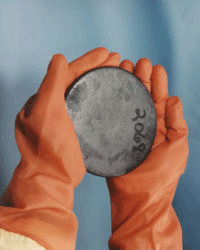Georgia tries to damage Russia’s image again launching far-fetched nuclear smuggle story
It transpired yesterday that a group of nuclear smugglers had been detained in the former Soviet republic of Georgia a year ago, in February. A citizen of Russia was supposedly named the leader of the criminal group. The information was originally distributed by US-based media outlets.

The New York Times and The Associated Press reported yesterday that Georgia, a republic of the Soviet Union, convicted four individuals in the summer of 2006 on smuggling charges. Russian citizen Oleg Khinsagov was sentenced to eight years in prison, whereas three Georgian nationals were sentenced to up to five years for an attempt to traffic 100 grams of enriched uranium. The plotters are currently serving their terms in Georgia, the AP said.
A spokesman for the Internal Affairs Ministry of Georgia, Shota Utiashvili, told the Vremya Novostei newspaper that Oleg Khitsagov, from North Ossetia, and three of his associates had been arrested in Georgia on February 1, 2006. The official added that there was no information revealed on the case for the sake of investigation secrecy.
The Georgian police delivered the particles of the withdrawn substance to Russia and suggested conducting joint investigation. Utiashvili said that Russia analyzed the substance and confirmed that it was a piece of weapons-grade uranium, but said nothing about its possible origin.
Russia’s Rosatom (Atomic Power Agency) subsequently stated that the sample presented by the Georgian law-enforcement agencies was so minute in its quantity, which made it impossible to establish the country of its origin. Russian experts determined that the enrichment level of the substance reached 90 percent.
US news sources describe Oleg Khinsagov as “a poorly-dressed 50-year-old man with hollow cheeks and thin moustache, who previously dealt with selling fish and sausage.” It was particularly said that the man carried two plastic packets of 100 grams of uranium in his pockets. The material was good enough for the production of an A-bomb. Georgian special services tracked down the smuggler and offered him a million dollars on behalf of a Muslim man from a serious organization.
The USA sent a group of FBI agents and energy specialists to Georgia after Khinsagov’s arrest. The analyses showed that the withdrawn nuclear material could be used in nuclear and defense industries.
The new information may stir up another international scandal and aggravate the relations between Russia and Georgia again. Konstantin Zatulin, the Director of the CIS Institute, said in an interview with the Vremya Novostei newspaper that there was nothing surprising about the fact that Georgian special services arrested the Russian citizens with CIA’s help. “The special services of Georgia are being controlled by the USA. This is a goal for Georgian President Mikhail Saakashvili. No wonder, the story with the smuggling of uranium-235, supposedly of the Russian origin, surfaced soon after the story with the poisoning of Russian spy Litvinenko,” the specialist said. Zatulin added that the information about the Russian nuclear smuggler was probably released a year after his arrest to damage Russia’s international image and present it as a country posing the danger of illegal proliferation of nuclear materials.
Uranium is more or less harmless to carry around because, like plutonium and polonium, it is an alpha-emitting radioactive material that does not penetrate the skin. Those materials are dangerous only if ingested.
The radioactive emissions of highly enriched uranium are so low that detectors often fail to pick them up if they are contained in a simple lead container. While it is not normally handled casually, research laboratories do not use the same precautions in handling highly enriched uranium that they use with other radioactive materials, the AP says.
A senior official from the Border Service of the Russian Federal Security Bureau, Vadim Shibayev, told the Vremya Novostei that all Russian air check points are outfitted with special equipment used to detect radioactive substances. The official added that he had never heard of the Russian citizen who supposedly smuggled highly enriched uranium from Russia to Georgia last year. Furthermore, a spokesperson for the Federal Customs Service, Natalia Sinikina, said that it was absolutely impossible to take 100 grams of uranium from Russia in a pocket.
Vremya Novostei
Translated by Dmitry Sudakov
Pravda.ru
Subscribe to Pravda.Ru Telegram channel, Facebook, RSS!


